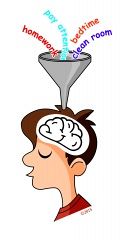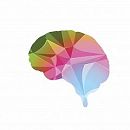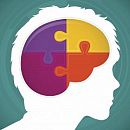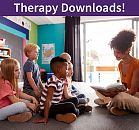Executive Function And Other Cognitive Considerations For Speech And Language Treatment Of Middle And High School Students #e130
Presenter: Martha S. Burns, PhD, CCC-SLP
Learn approaches to help middle and high school age students compensate for Executive Function difficulties in the classroom.
– K.H., prior course participant
Read more comments about this course!
Executive Functions (EFs) and other aspects of Cognitive Control mature well into adulthood. Adolescents are, in many ways, just beginning this journey.
This practical course reviews the research on maturation of these aspects of cognition in typical middle and high school age students and those with EF difficulties. EFs reviewed include: attention, theory of mind, working memory, decision making, emotional regulation and goal setting. How these impact classroom performance is specifically addressed.
This course then presents approaches that SLPs can use to help middle and high school age students compensate for EF difficulties in the classroom. Finally, pharmacological interventions as well as evidence-based methodologies for building executive function skills are reviewed.
Course is offered for 0.2 ASHA CEUs – 2 Contact Hours.
Course Overview – Run Time: 2:00:58
Section 1
- Neuroscience of Executive Function
- Organization of the Frontal Lobe
- Development of Frontal Lobe Functions
- Ventromedial Prefrontal Cortex
- Dorsal Lateral Prefrontal Cortex
- Executive Functions and Cognitive Control
- Attention
- Theory of Mind
- Working Memory
- Decision Making
- Goal Setting
Section 2
- Executive Function in the Classroom - Practical Applications
- Executive functions built in the classroom
- Those that involve cognition
- Those that involve doing
- Four Quadrant model
- Supporting students who need direct interventions
- Supports: materials, reading, math
- Emotional Regulation
- Cognitive Control
- Goal Setting
- Attention - medications and other alternatives
– J.T., prior course participant
Read more comments about this course!
– R.D., prior course participant
Read more comments about this course!
The content of this online CE course does not focus exclusively on any specific proprietary product or service. Presenter financial and non-financial disclosures may be found in the Presenter & Disclosures area.
Video PowerPoint presentation with author narration & downloadable handout. Stop and re-start the course at any point. Learners retain access to course content after completion for ongoing reference and review.
Reviews
"The entire section of classroom activities and intervention tools was EXCELLENT - practical for teachers/therapists, reasonable for parents, and immediately implementable! I appreciate the breakdown of executive functions and the direct examples of how those are manifested in tasks for middle school and high school students. I also found it useful to be reminded that pre-teens and teens tend to be reward-oriented, not goal or process-oriented." D.D. (Jan. 2024)
"Organizing therapy sessions was beneficial. Applicable content." A.R. (Dec. 2023)
"Functional therapeutic activities and strategies. I liked all of it!" K.R. (Dec. 2023)
"Beneficial strategies to use for students that have Executive Functioning deficits especially in organization. The overall course was easy to follow and informative." P.N. (Nov. 2023)
"I liked the easy-to-implement routines/strategies to support multiple aspects of executive functioning. The strategies appear relatively low prep to implement into a speech session that will set up students to improve various executive functioning skills." H.W. (Nov. 2023)
"Practical strategies and activities I can use in my daily sessions." S.F. (Oct. 2023)
"I liked the practical activities provided for specific areas of need that can be used when working with students." T.M. (Sep. 2023)
"Practical examples in regards to reading, writing, math, language, etc. and how to address executive functioning. I liked the practical examples." J.U. (Sep. 2023)
"The ideas for therapy were beneficial, such as predicting consequences, using graphic organizers. I liked that the instructor gave specific examples." K.F. (Sep. 2023)
"I felt like I could add these ideas easily right away. I appreciated that there were many suggestions for supporting the students I work with instead of just a few ideas given at the end. The organization of the strategies was helpful." S.Q. (Aug. 2023)
"I liked the hands-on ideas for warm-ups." D.K. (Aug. 2023)
"I think the 4 quadrant model of facilitated learning will come in handy! I found the anatomy and physiology intro portion very interesting, especially since I really didn't know specifically how the prefrontal cortex functions." N.G. (Jul. 2023)
"Great list of specific objectives under the category of Executive Functioning and techniques for each one. I liked the various techniques and references for further study." T.E. (Jul. 2023)
"Practical uses and activities for students. Examples on how to use strategies to increase executive function skills." J.W. (Jul. 2023)
"I liked the ideas to use in therapy. This course was very informative and offered precise definitions and examples as well as ideas to put into practice." M.J. (Jun. 2023)
"Specific ideas to enhance EF. I liked the examples of strategies to implement in the classroom." K.M. (Jun. 2023)
"I liked the strategies for helping students. Clear support of content with research." N.F. (May 2023)
"Linking neuroscience to function. I liked the advice and strategies." C.H. (May 2023)
"I liked the discussion on neuroanatomy." H.H. (Feb. 2023)
"Executive Function in the classroom - I loved the Student Planner suggestions - This will be very easy to implement." A.D. (Sept. 2022)
"Provided very practical tips. I liked the speaker's proven level of expertise. And learning the neurological foundations and principles to better understand EF." H.H. (Jul. 2022)
"Good examples given throughout course. I particularly liked the research supporting Growth Mindset since the students I work with have language disorders." M.F. (Jun. 2022)
"I liked the session on working memory." A.M. (Jun. 2022)
"Overview of the brain regions and specific strategies to help students was beneficial." S.M. (Jun. 2022)
"I liked the suggestions for treatment, particularly suggestions for working memory." J.A. (May 2022)
"The discussion on using planners as an organizational tool was helpful. Also, the use of a routine and how crucial it is was helpful to know with this age group." A.L. (Apr. 2022)
"I liked how the presentation was grouped into two parts. I liked the flow and found it is easy to follow along with and stay engaged." A.L. (Apr. 2022)
"I loved the treatment suggestions for students and will implement as many as possible as I work with teens frequently." B.S. (Apr. 2022)
"Dr. Burns' organization and presentation of the material is unparalleled. She is an excellent teacher and clinician who does an excellent job of explaining the neuroanatomy details, pertinent research and links that with relevant clinical suggestions for treatment." B.S. (Apr. 2022)
"Understanding brain development in adolescences was helpful. Identifying specific strategies to aid instruction in each area e.g. how to complete the planners. The instructor's tone of voice and pace was pleasant and conversational - not too fast and kept my interest." S.W. (Apr. 2022)
"Liked the ideas for therapy. The material was broken down to easily understand it." K.D. (Apr. 2022)
"Good explanations for specific interventions - classroom strategies." B.L. (Mar. 2022)
"I liked the information on attention and the classroom strategies." G.T. (Mar. 2022)
"I liked the classroom activities, and the strategies to help improve executive functioning." M.H. (Mar. 2022)
"Clear and well-organized presentation. Addressed a variety of issues. Excellent graphics! I liked the strategies to help students with reading and writing skills." N.K. (Feb. 2022)
"I liked the information about reading and writing exercises. I also liked the explanation of the different ADHD medicines." E.C. (Dec. 2021)
"Good strategies to use with older students." M.B. (Dec. 2021)
"Practical strategies, activity suggestions, and good resources." T.F. (Dec. 2021)
"I really liked all of the classroom activities and suggestions and the examples provided." T.F. (Dec. 2021)
“I liked the sections on goal setting, improving reading, and improving writing skills. The entire part 2 was great!” A.C. (Dec. 2021)
“This course was outstanding. Useful and practical. I have recommended this course to my colleagues who work with children who have social language difficulties.” R.D. (Nov. 2021)
“The review of the organization of the frontal lobe and the development of its functions was extremely helpful.” J.B. (Nov. 2021)
"Understanding the things that motivate teenagers and how to engage them in functional tasks will be beneficial for my daily practice. I liked the examples of activities and research in neuroscience." M.D. (Sept. 2021)
"Specific classroom strategies, routines, and good strategies for reading and writing. I liked the visuals and info about planners and graphic organizers." I.H. (Sept. 2021)
"Any ways that can help different students in the classroom, especially 6-8th graders will help my daily practice. Liked the activities to help the student with working memory and organizational skills." M.O. (Aug. 2021)
“It was very thorough and confirmed the importance of the work I do. I found it very interesting how high school behavior is specifically related to brain development.” P.B. (Aug. 2021)
"I liked the specific examples to work on to address specific areas of executive functioning. I liked how much information she provided. She also mentioned many ways to help students in the classroom." V.D. (Jun. 2021)
"I liked the many ideas and strategies to use with students. They were very practical." R.L. (Jun. 2021)
“I found the practical suggestions for addressing organization, working memory, selective attention, and visual memory very helpful. These are ideas I can easily put into practice with my students.” K.H. (Jun. 2021)
“While I found the intervention strategies most beneficial for my practice, I liked that the presenter started with a discussion of the neurology behind executive functioning as it was a good starting place to understand what's going on in the brain and why our students may be struggling. Also, I found it helpful to learn about the myelinating and the pruning of different areas of the brain at different stages in life.” M.W. (Mar. 2021)
"I appreciated the practical applications, graphic organizers, and going over the specifics of neurological development." L.C. (Mar. 2021)
"I loved the strategies!! So much information!!" M.B. (Jan. 2021)
"I enjoyed the suggestions for students in goal setting." M.V. (Jan. 2021)
Course Objectives
- Describe the neurophysiology of dorsolateral prefrontal lobe functions including attention, working memory, decision making and goal setting.
- Describe the neurophysiology of theory of mind and its impact on social maturation.
- Apply the maturational data on prefrontal lobe to evaluation of middle school (MS) and high school (HS) students with EF disorders.
- Describe the ways EFs impact classroom performance.
- Apply information about EFs that involve cognition to develop strategies for MS and HS age students.
- Apply information about EFs that involve completing assignments to develop strategies for MS and HS age students.
- Apply the Four Quadrant Model to decrease student reliance on adults to manage behavior and classroom tasks.
- Create supports for students who are unable to achieve independence in EF components of school achievement.
- Apply a backwards design to enhance goal achievement among adolescents and young adults with EF disorders.
Presenter & Disclosures

Speaker Disclosures:
Financial — Martha Burns is a presenter of online CEU courses sponsored by Northern Speech; receives royalty payments.
Financial — Martha Burns is a paid consultant for Scientific Learning Corporation.
Nonfinancial — Martha Burns has no relevant nonfinancial relationships to disclose.
Intended Audience / Accreditation

This program is offered for 0.2 ASHA CEUs (Intermediate Level; Professional Area).

Intended Audience
- Speech-Language Pathologists
ASHA CEUs: NSS online courses are registered with ASHA and are offered for ASHA CEUs. The number of ASHA CEUs is noted above. Note that 0.1 ASHA CEU = 1 contact hour = equals 1 CEE.
ASHA CE Registry: During the enrollment process, if you select to receive ASHA credit for this course and if you provide your ASHA number, NSS will automatically submit your CEU information to the ASHA CE Registry after successful course completion (80% on post test). This submission happens once per month, during the first week of the month. For example, if you complete your course on November 7th, NSS will submit all November online course CEUs to ASHA during the first week of December. When ASHA inputs the information into their database, they will mark the course as completed on the last day of the month in which it was completed, so November 30th using this example. The certificate of completion available for you to print immediately, however, will reflect the actual completion date, November 7th in this example. Due to ASHA processing procedures please allow 2-3 weeks, from the submission date, for the course to appear on your ASHA transcript.
ASHA CEUs: Attendees must meet at least one of the following conditions in order to be eligible to earn ASHA CEUs:
- Current ASHA Member.
- ASHA Certificate of Clinical Competence (CCC) Holder.
- Licensed by a state or provincial regulatory agency to practice speech-language pathology (SLP) or audiology.
- Credentialed by a state regulatory agency to practice SLP or audiology.
- Credentialed by a national regulatory agency to practice SLP or audiology.
- Engaged in a Clinical Fellowship under the supervision of an individual with their ASHA CCC.
- Currently enrolled in a master's or doctoral program in SLP or audiology.
If an attendee is not an ASHA member or CCC holder but meets any of the above criteria, they may inform the ASHA CE Registry of their eligibility by visiting this site.
Licensing Boards: Most state licensing boards DO accept CEUs earned online (usually classified as home-study credits). Some state boards do, however, place a limit to the number of credits that can be earned via home study/online courses. For the most current information, we suggest that you contact your licensing board or agency to verify acceptance policies and/or any credit limits related to home-study courses prior to registering for this course.
Additional accrediting agencies by which Northern Speech is an approved CE provider:
- California: NSS is approved as a provider of continuing education by the California Speech-Language Pathology & Audiology Board. Provider #PDP4. Online CEU limits may apply; please contact SLPAHADB for current online CEU acceptance policies.
- Iowa: NSS is approved as a provider of continuing education by the Iowa Board of Speech Pathology and Audiology Examiners. Provider #169.
- Kansas: NSS is approved as a provider of continuing education by the Kansas Department of Health and Environment. Provider #LTS-S0005.
- Florida: NSS is approved as a provider of continuing education by the Florida Speech-Language Pathology and Audiology Board. Provider #SPA-026.
- New Jersey: NSS is approved as a provider of continuing education by the New Jersey Department of Education. Provider #1654.
Frequently Asked Questions
Customer Support: Please phone 888.337.3866 or email info@northernspeech.com.
Course Completion Timeframe:
You have unlimited time to complete our online courses. You may log off and log on as often as you’d like to in order to complete all sections of a course.
However, completion dates are based on Eastern Standard Time. Therefore, if you need your CEUs by a certain date, be sure to complete the course test before 11:59pm EST on that date. For example, if you need CEUs before January 1st, you will need to complete the course test before 11:59pm EST on December 31st.
Content Access:
Access to course materials and content does not expire, even after completing the post test. You may continue to review course material by logging into your NSS account, clicking the My Online Courses tab, and then viewing your desired course.
Certificate of Completion:
On successful completion of the post test (80%), a certificate will be immediately available for download and/or printing. This certificate will include your name, date of completion (based on Eastern Time Zone, USA/Canada), and number of contact hours (CEUs / CEEs). Please note that CEUs are awarded on the date of successful test completion, not the date of course enrollment. Please ensure that you successfully complete the post test prior to any licensure renewal dates.
ASHA CE Registry Submission:
During the enrollment process, if you select to receive ASHA credit for this course and if you provide your ASHA number, NSS will automatically submit your CEU information to the ASHA CE Registry after successful course completion (80% on post test). This submission happens once per month, during the first week of the month. For example, if you complete your course on November 7th, NSS will submit all November online course CEUs to ASHA during the first week of December. When ASHA inputs the information into their database, they will mark the course as completed on the last day of the month in which it was completed, so November 30th using this example. The certificate of completion available for you to print immediately, however, will reflect the actual completion date, November 7th in this example. Due to ASHA processing procedures please allow 2-3 weeks, from the submission date, for the course to appear on your ASHA transcript.
Purchase Orders:
Purchase orders are currently not accepted for online orders, if you wish to submit a purchase order please do so at info@northernspeech.com or fax to 888-696-9655.
What is an Online Course?
Our Online Courses consist of video, audio, and/or text content and are offered for ASHA CEUs. Unlike a webinar, which requires participants to be logged on and at a computer at specific times, our Online Courses are available to you at any time, from any device, via your NorthernSpeech.com online account. You may work at your own pace and start and stop your course as you wish. Your course will conclude with a short post test. On successful completion of the post test (>80%), a printable certificate of completion is presented to you.
Receiving CEUs:
Northern Speech is an ASHA CE Provider and our online courses are registered with ASHA and offered for ASHA CEUs. Please note that successful completion of the online post test is required prior to the awarding of CEUs. Please contact your state licensing board for acceptance policies related to CEUs earned online. Please note that courses offered for university students are not applicable for CEUs.
Registering for an online course:
You may browse all online courses by clicking the Continuing Education tab above, then Online Courses. Once you find a course, click Enroll Now, and you will be asked to either log into your existing Northern Speech account or create a new online account. Once you’ve entered your account information and provided your credit card payment, your course will be immediately available to you.
Accessing your purchased course or returning to a purchased course:
You will be able to access your online course by logging into your Northern Speech account and then clicking the My Online Courses tab on your profile screen. Click the course you would like to start or to resume. From there, proceed through the course sections until you are ready to complete the post test. You do not have to complete your course all at once. You may log on and off as you wish.
Testing requirements:
Each online course concludes with a post test consisting of multiple choice or true & false questions. Scores of 80% or greater are required for successful course completion and awarding of CEUs. You may revisit course materials and retest as needed to achieve a passing score.
Number of CEUs offered:
We offer courses from 1 to 21 contact hours. Each course will note the number of CEUs offered. Please note that 0.1 CEU = 1 contact hour = 1 CEE.
State licensing boards and online CEUs:
NSS is an ASHA CE Provider and most state licensing boards DO accept ASHA CEUs earned online (usually classified as home-study credits). Some boards do, however, place a limit to the number of CEUs that can be earned via home study/online courses. For the most current information, we suggest that you contact your licensing board or agency to verify acceptance policies and/or any CEU limits related to home-study courses prior to enrolling in an online course.
Course formats:
Our course formats include: text, audio, video, and PowerPoint with author narration. Each course will note the format on the course description page. Most courses include closed captioning.
Course handouts:
Most of our online courses provide a link to download the accompanying handout as a PDF file.
Group discounts:
Groups of 3 or more are eligible for a 20% discount on each registration on most of our online courses. To receive this discount, registrations need to be processed together via the "Group Rates" tab on the Online Course of your choice.
Computer requirements:
For our online courses to function best, we recommend that you update your computer to include the newest version of your Internet browser (Safari, Chrome, Firefox, Edge, Internet Explorer, etc.) and newest version of your computer's operating system. Also a high-speed Internet connection is recommended (cable or DSL). Speakers or headphones will be required for many of our courses as many contain audio components.
Course Cancellation Policy:
A purchased online course can be exchanged, refunded, or transferred to another individual if contact is made with NSS (via phone or email) within 30 days of purchase and the course materials have not been viewed or downloaded.
Special Needs:
Please click here for any special needs requests, and we will do our best to accommodate them.
| Contact Us |










